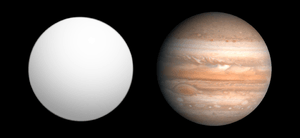WASP-7b
| Exoplanet | List of exoplanets | |
|---|---|---|
 | ||
| Parent star | ||
| Star | WASP-7 | |
| Constellation | Microscopium | |
| Right ascension | (α) | 20h 44m 10.2190s |
| Declination | (δ) | −39° 13′ 30.894″ |
| Apparent magnitude | (mV) | 9.51 |
| Distance | 490 ly (150 pc) | |
| Spectral type | F6 | |
| Orbital elements | ||
| Semi-major axis | (a) | 0.0618+0.0014 −0.0033 AU |
| Eccentricity | (e) | 0 |
| Orbital period | (P) | 4.954658+5.5e-5 −4.3e-5 d |
| Inclination | (i) | 89.6+0.4 −0.9° |
| Time of transit | (Tt) | 2453985.0149+0.0009 −0.00012 JD |
| Physical characteristics | ||
| Mass | (m) | 0.96+0.12 −0.18 MJ |
| Radius | (r) | 0.915+0.046 −0.04 RJ |
| Density | (ρ) | 1660 kg m−3 |
| Surface gravity | (g) | 3.03 g |
| Temperature | (T) | 2000 |
| Discovery information | ||
| Discovery date | April 1, 2008 | |
| Discoverer(s) | Cameron et al. (SuperWASP) | |
| Discovery method | Transit | |
| Discovery site | SAAO | |
| Discovery status | Published | |
| Database references | ||
| Extrasolar Planets Encyclopaedia | data | |
| SIMBAD | data | |
| Exoplanet Archive | data | |
| Open Exoplanet Catalogue | data | |
WASP-7b is an extrasolar planet discovered in 2008. This 5-day period planet is slightly smaller than Jupiter, roughly the same mass and more dense.[1]
See also
References
- ↑ Hellier; et al. (December 11, 2008). "WASP-7: A BRIGHT TRANSITING-EXOPLANET SYSTEM IN THE SOUTHERN HEMISPHERE". The Astrophysical Journal Letters. 690 (1): L89–L91. arXiv:0805.2600
 . Bibcode:2009ApJ...690L..89H. doi:10.1088/0004-637X/690/1/L89.
. Bibcode:2009ApJ...690L..89H. doi:10.1088/0004-637X/690/1/L89.
External links
![]() Media related to WASP-7b at Wikimedia Commons
Media related to WASP-7b at Wikimedia Commons
Coordinates: ![]() 20h 44m 10s, −39° 13′ 31″
20h 44m 10s, −39° 13′ 31″
This article is issued from Wikipedia - version of the 2/4/2016. The text is available under the Creative Commons Attribution/Share Alike but additional terms may apply for the media files.